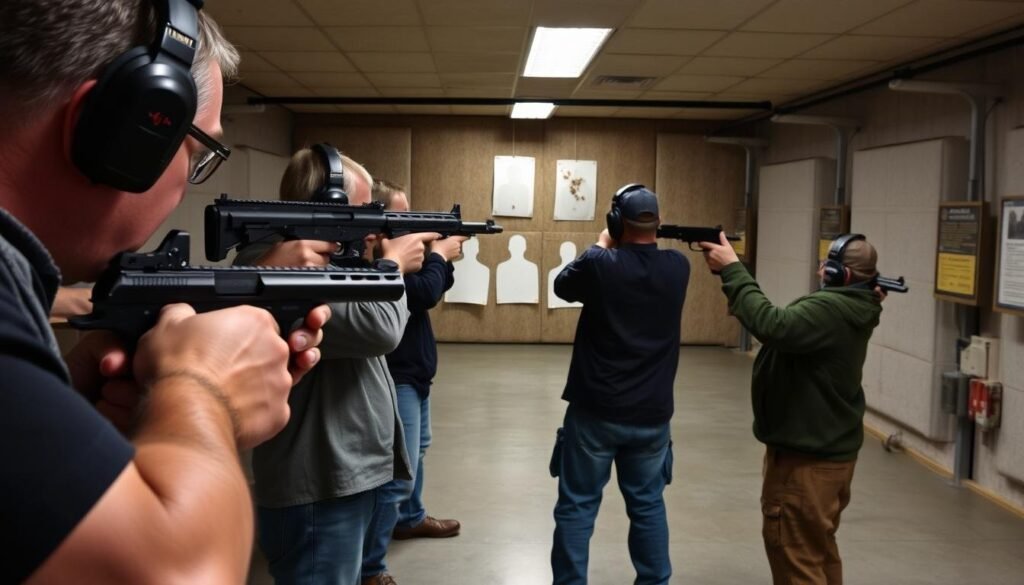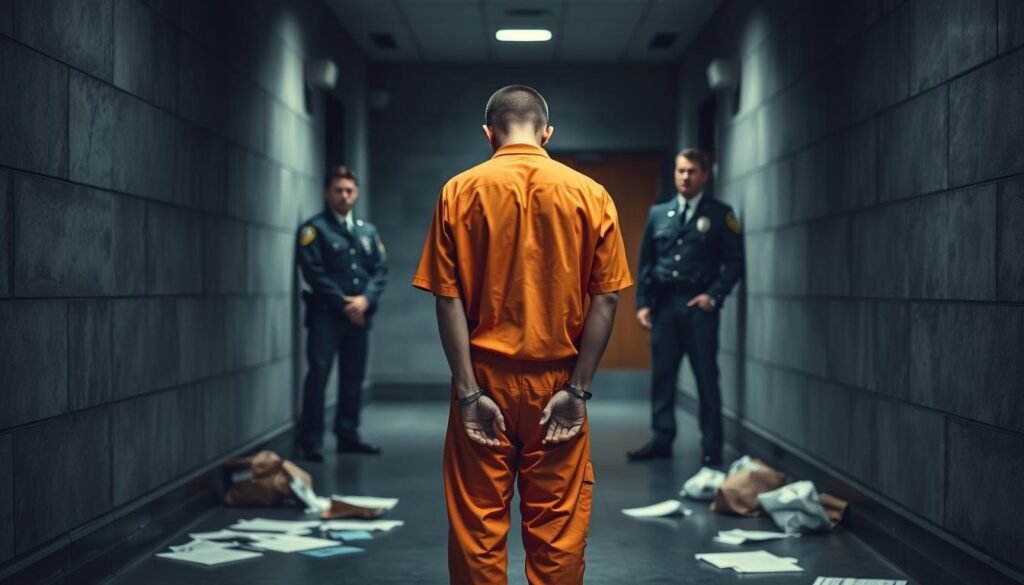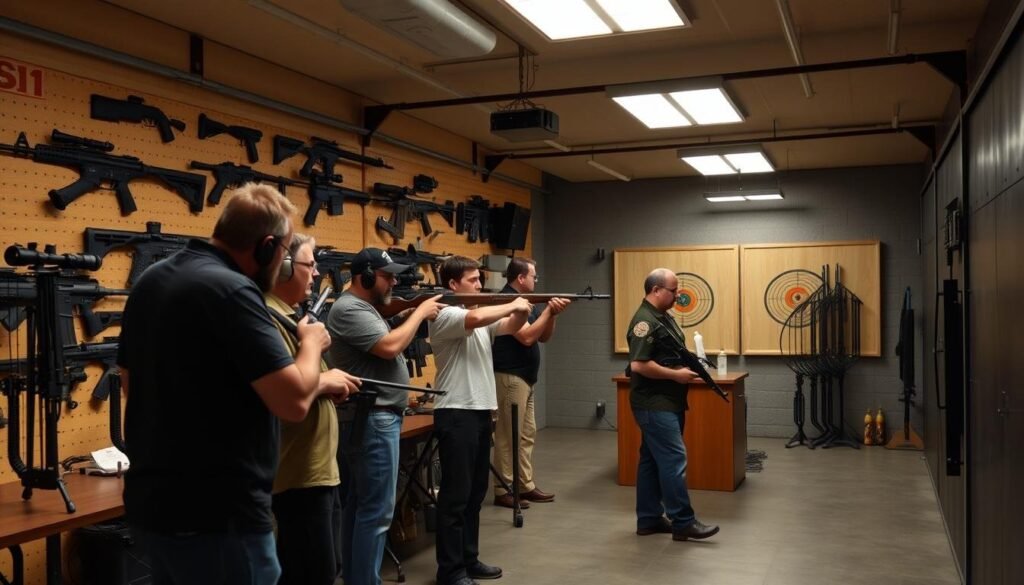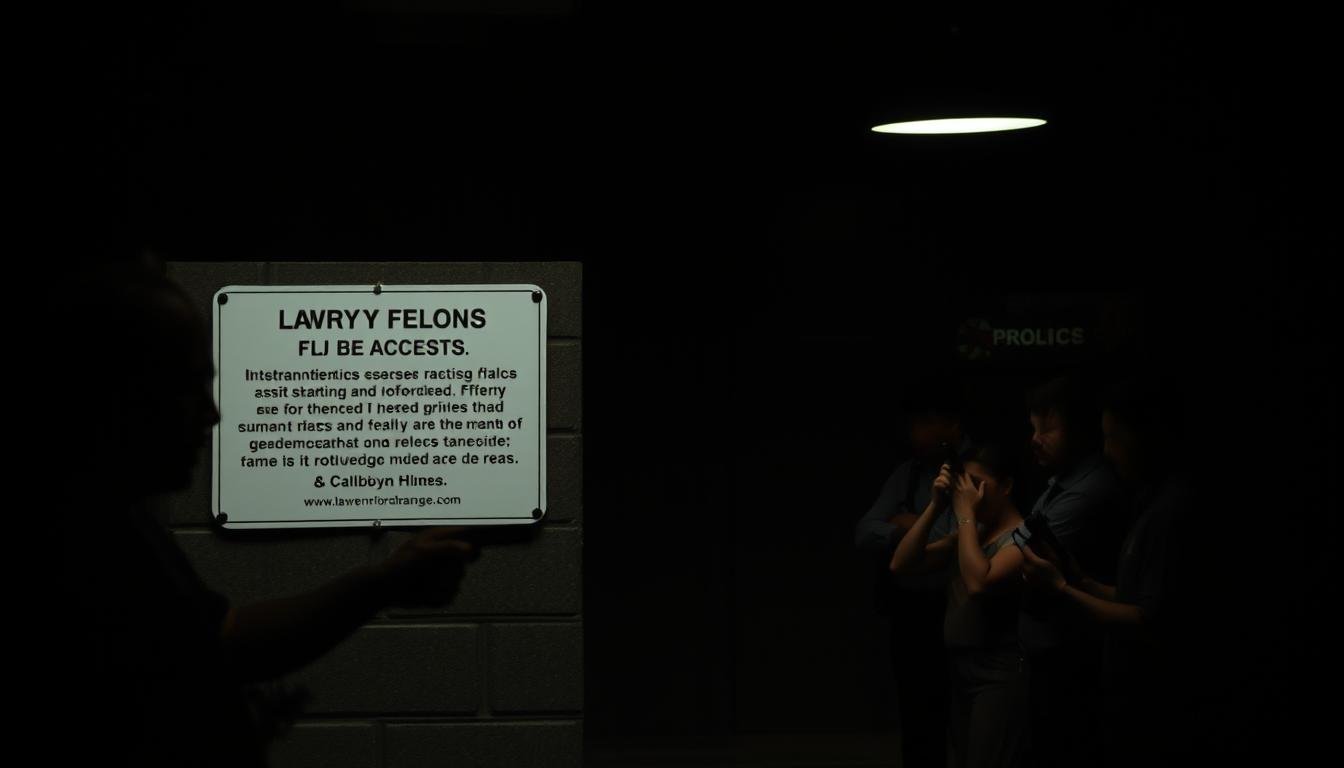Can Felons Go to a Shooting Range? If you’re a felon thinking about visiting a shooting range, you’re not alone. Many people with felony convictions are unsure about their rights. They also don’t know the laws about firearms and shooting facilities.
Understanding the rules is crucial before you go to a shooting range. The laws about felons and guns are complex. They change a lot from one state to another.
You need to know the gun laws for felons in your state. This will help you avoid legal trouble. Learning these rules will help you decide if you can visit a shooting range.
Knowing the felons shooting range laws is important. It makes sure you follow the law. Let’s look into these laws and what they mean for you.
Contents
- 1 Federal Firearms Laws for Convicted Felons
- 2 Understanding “Possession” in Legal Terms
- 3 State-by-State Variations in Gun Laws for Felons
- 4 Can Felons Go to Shooting Range? The Legal Reality
- 5 Types of Shooting Ranges and Their Policies
- 6 Background Check Procedures at Shooting Ranges
- 7 Supervised Shooting Possibilities for Felons
- 8 Consequences of Illegal Range Attendance
- 9 Restoration of Gun Rights for Felons
- 10 Legal Alternatives for Felons Interested in Shooting Sports
- 11 Common Misconceptions About Felons and Shooting Ranges
- 12 Conclusion: Can Felons Go to a Shooting Range?
- 13 FAQ
- 13.1 Can a felon visit a shooting range?
- 13.2 What is considered “possession” of a firearm for a felon?
- 13.3 How do shooting ranges verify an individual’s criminal history?
- 13.4 Can a felon’s gun rights be restored?
- 13.5 What are the consequences for a felon attending a shooting range illegally?
- 13.6 Are there any legal alternatives for felons interested in shooting sports?
- 13.7 How do state laws impact a felon’s ability to visit a shooting range?
- 13.8 Can a felon handle firearms at a shooting range under supervision?
- 13.9 What is the difference between violent and non-violent felony convictions regarding firearms laws?
- 13.10 How can felons find out if they are allowed to visit a shooting range?
Federal Firearms Laws for Convicted Felons
It’s key for those with felony convictions to know federal firearms laws. These laws outline what rights are kept and what are lost after a felony. This includes rights to possess and use firearms.
Under federal law, people with felony convictions can’t have firearms. This rule is to keep the public safe from those with a history of serious crimes.
The type of felony matters under federal law. [Can Felons Go to a Shooting Range?]
Differences Between Violent and Non-Violent Felony Convictions
Violent felonies lead to stricter rules on having firearms. Non-violent felonies are also covered by federal laws. But, the impact can vary based on the case and where you live.
| Type of Felony Conviction | Federal Firearm Possession Prohibition | Potential Exceptions |
|---|---|---|
| Violent Felony | Strict prohibition | Rare, typically requires pardon or expungement |
| Non-Violent Felony | Prohibition, but may vary by jurisdiction | Possible restoration of rights under certain conditions |
People with felony convictions need to grasp these laws to stay out of trouble. Talking to a lawyer can help understand your situation better and find ways to move forward.
Understanding “Possession” in Legal Terms
For felons, it’s key to understand the legal meaning of “possession” when it comes to guns. “Possession” is more than just owning a gun. It also includes both actual and constructive possession.
Actual possession means you have the gun in your hands. Constructive possession is when you can control the gun, even if it’s not right in front of you. For instance, having a gun in your home or car counts as constructive possession.
Felons can’t have guns, and the risks of handling them are big. Even if a felon doesn’t own a gun, touching one could break their parole or probation rules.
It’s very important for felons to know the strict rules about guns. If you’re a felon thinking about going to a shooting range or handling guns, you need to know the legal risks. Talking to a lawyer who knows about gun laws in your area can help a lot.
Knowing the details of gun possession laws and the dangers of handling guns can help you make smart choices. This way, you can avoid legal trouble. [Can Felons Go to a Shooting Range?]
State-by-State Variations in Gun Laws for Felons
Gun laws for felons differ a lot across the United States. This creates a confusing mix of rules. It’s key for felons to know these differences to avoid legal trouble.
In some places, felons can’t go to shooting ranges. In others, they might be allowed under certain conditions. For example, some states let felons join shooting sports with supervision. But others have laws that stop them from using or owning guns.
What affects gun laws for felons includes the type of crime, how long ago it happened, and if rights have been restored. For example, some states might let felons with non-violent crimes visit ranges after a while. But those with violent crimes might face tougher rules.
Looking at specific states shows a wide range of laws. Some states are more lenient, letting felons visit ranges under certain rules. Others have strict rules that keep felons out of ranges.
Felons need to learn about their state’s laws. They should know about background checks, supervision, and other rules that apply. [Can Felons Go to a Shooting Range?]
Knowing the laws helps felons make smart choices about visiting ranges. It also helps them avoid legal problems. Remember, laws can change, so it’s important to stay up to date.
Can Felons Go to Shooting Range? The Legal Reality
Felons thinking about going to a shooting range need to know the law first. The rules about felons at shooting ranges vary a lot, depending on where you are.
In the U.S., federal law says felons can’t have guns, which means they can’t use them at shooting ranges. But, the rules can change from state to state. Some places might let felons be at shooting ranges, but only if they don’t touch the guns.

Even if a state lets felons at shooting ranges, they can’t handle or own guns. Felons face big limits on their shooting activities.
To deal with these complex laws, felons should:
- Look up the laws in their state about felons and guns.
- Find out what the shooting range’s rules are.
- Get legal advice to make sure they follow all laws.
By doing these things, felons can understand their rights better. They can then make smart choices about going to a shooting range.
Types of Shooting Ranges and Their Policies
The type of shooting range you visit can affect if you can participate, especially with a felony conviction. Shooting ranges have different rules for people with felony records.
Shooting ranges fall into public and private, and indoor and outdoor categories. Public ranges have stricter rules and background checks. Private ranges might be more flexible but still follow the law.
Background checks are used to check an individual’s criminal history. These checks can be simple or detailed, depending on the range. [Can Felons Go to a Shooting Range?]
When you try to use a shooting range, you might need to show ID and pass a background check. This check looks for felony convictions in national and state databases.
It’s important to know the rules and background check process for shooting ranges. This is especially true for those with felony convictions. Researching the range’s policies can help avoid legal problems.
Background Check Procedures at Shooting Ranges
Before you can shoot at a shooting range, you must pass a background check. This is a key step to keep guns out of the wrong hands. It’s not just a rule; it’s a safety must.
These checks follow federal and state laws. You’ll need to show your ID. Then, it’s checked against a database for any criminal history or other issues.
Every shooting range has its own way of doing background checks. But they all follow a basic process. Here’s what usually happens:
- Providing valid government-issued ID
- Filling out a form with personal details
- Running the provided information through a background check database
- Waiting for the results, which can take a few minutes to longer, depending on the range and the complexity of the check
For people with felony convictions, these checks are especially important. Federal law says felons can’t have guns. So, a check will likely show if you have a felony, keeping you from using the range.
It’s important to know that background checks are not just a rule. They’re a law. Shooting ranges must follow these rules to stay legal and keep everyone safe.
Supervised Shooting Possibilities for Felons
Felons might find ways to enjoy shooting sports, even with gun laws. This depends on state laws and shooting range rules. You can still shoot under supervision, even if you can’t own a gun.
Being with a licensed person or a firearms expert is one way. Some ranges let you shoot if you’re with someone who knows the rules. It’s crucial to check the specific policies of the shooting range you plan to visit.
There are also special programs for felons. These programs teach you about gun safety and handling. They’re run by certified pros.
To find out what’s possible for you, do the following:
- Research local shooting ranges and their policies regarding felons.
- Look into specialized shooting programs that cater to individuals with felony convictions.
- Consult with legal counsel or a firearms expert to understand the legal implications and possibilities.
By doing these things, you can learn about your options for supervised shooting. Always follow the law to avoid legal trouble. [Can Felons Go to a Shooting Range?]
Consequences of Illegal Range Attendance
If you’re a felon thinking about visiting a shooting range, know the risks. Going to a shooting range without permission can lead to serious legal trouble. This includes facing more felony charges.
The legal trouble you could get into is serious. If you’re a felon with a gun or at a shooting range without permission, you could get a long prison sentence. You might also have to pay a lot of money in fines.

There are many cases where felons got in trouble for being at shooting ranges. For example, in California, a felon was caught at a range and got charged with more felonies.
| Case | Charge | Outcome |
|---|---|---|
| California vs. John Doe | Felon in possession of a firearm | 5 years imprisonment |
| Florida vs. Jane Doe | Unauthorized attendance at a shooting range | 3 years probation, $5,000 fine |
These cases show how serious it is to be at a shooting range illegally. Felons need to know the laws about their rights and the penalties for breaking them.
Knowing the law can help you make smart choices and avoid big legal problems.
Restoration of Gun Rights for Felons
Felons wanting to get their gun rights back face a tough legal journey. This journey changes a lot depending on where you are. It involves many legal steps, each with its own hurdles and rules.
The first thing you need to do is learn about the laws in your state. State laws differ a lot, with some being easier to follow than others. Knowing the laws that apply to you is very important.
Success Rates and Costs Involved
How well you can get your gun rights back depends a lot on where you are and your case. Things like the type of felony, how long ago it happened, and how you’ve acted since then matter a lot.
The cost of trying to get your gun rights back can also change. You might have to pay for a lawyer, court fees, and other things related to the petition. It’s a good idea to talk to a lawyer to figure out how much it might cost.
One important part of getting your gun rights back is filing a petition to the court. This might need a lawyer’s help. The court will look at your criminal history and how you’ve acted since then when making their decision.
In summary, getting your gun rights back as a felon is a tough but possible journey. Knowing the legal steps, understanding the costs, and getting legal advice are key to success.
Legal Alternatives for Felons Interested in Shooting Sports
Shooting sports fans with felony convictions have legal options. Some restrictions keep felons out of traditional shooting ranges. But, there are other ways to enjoy shooting sports.
One choice is archery or other sports that don’t use guns. Many archery ranges have classes and competitions. They can be as exciting as shooting sports. [Can Felons Go to a Shooting Range?]
Another option is to join the shooting sports community as a spectator. Felons can watch and learn at shooting range events. This way, they can still be part of the community.
| Alternative | Description |
|---|---|
| Archery | Participate in archery ranges that offer classes and competitions. |
| Spectator Events | Attend shooting sports events as a spectator to stay engaged with the community. |
| Coaching or Training | Explore opportunities to coach or train others in shooting sports, if permitted by local laws. |

Felons might also coach or train others in shooting sports. This is possible if local laws allow it. It’s a rewarding way to stay involved legally.
By looking into these legal options, felons can keep enjoying shooting sports. They can do this while following the law.
Common Misconceptions About Felons and Shooting Ranges
Many people think felons can’t go to shooting ranges. But, the truth is more complex. It’s not a simple yes or no.
Some think all shooting ranges have the same rules for felons. But, each range has its own rules and laws.
Another myth is that felons can’t touch guns, even with someone watching. While there are federal limits, some states let felons shoot under supervision.
It’s also wrong to think that going to a shooting range as a felon will lead to big legal problems. The outcome really depends on the situation and the state’s laws.
Knowing these myths helps you understand the legal world better. It’s key to know the laws in your area. [Can Felons Go to a Shooting Range?]
Conclusion: Can Felons Go to a Shooting Range?
You’ve now learned about the rules for felons at shooting ranges. It’s important to know the laws before you go. Federal laws say felons can’t have guns, but some states have different rules.
Some shooting ranges might let felons in, but they must follow the range’s rules and state laws. If you’ve been convicted, you might be able to get your gun rights back. There are also other shooting sports you can try.
To have a safe and legal time, you need to know the laws in your state. This way, you can decide if you can go to a shooting range or not.
See Also: Righteous Felon Beef Jerky: Snack Like a Rebel
FAQ
Can a felon visit a shooting range?
It depends on your state’s laws and the range’s policies. Some ranges might let felons visit under certain rules. Others might not.
What is considered “possession” of a firearm for a felon?
Possession means you have the firearm in your hands or control it. It’s not just about holding it. It also means you can control it, even if it’s not right there.
How do shooting ranges verify an individual’s criminal history?
They use background checks through the National Instant Background Check System (NICS) or state databases. This helps them check if you have a criminal record.
Can a felon’s gun rights be restored?
Yes, sometimes. You need to ask a court to restore your rights. The process and if you can succeed vary by state. There are costs and success rates involved.
What are the consequences for a felon attending a shooting range illegally?
Breaking the law can lead to more felony charges, fines, and jail time. There are real examples of how serious these penalties can be.
Are there any legal alternatives for felons interested in shooting sports?
Yes, there are. Felons can try archery or other sports that don’t involve guns. This way, they can still enjoy shooting sports legally.
How do state laws impact a felon’s ability to visit a shooting range?
State laws are different, and some are stricter about felons and guns. Knowing your state’s laws is very important. [Can Felons Go to a Shooting Range?]
Can a felon handle firearms at a shooting range under supervision?
Sometimes, yes. Some ranges might let felons handle guns if they’re supervised. But it depends on the range’s rules and local laws.
What is the difference between violent and non-violent felony convictions regarding firearms laws?
Federal laws treat violent and non-violent felonies differently. Violent felonies usually have stricter rules about guns. [Can Felons Go to a Shooting Range?]
How can felons find out if they are allowed to visit a shooting range?
You should look up your state’s laws and the range’s policies. Talking to a lawyer can also help you understand your rights.

Van Maldonado, born in California, holds a degree in Criminology and Police Science. Currently serving as an investigative officer at a local police station, he spends his leisure time writing insightful content for FelonScope.com.

